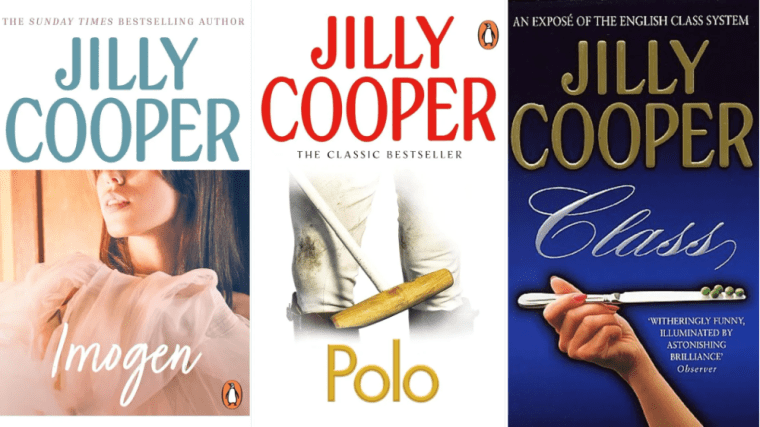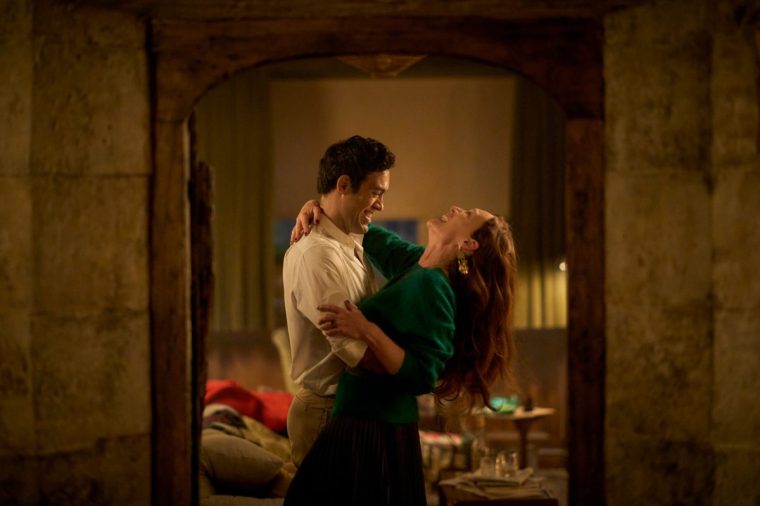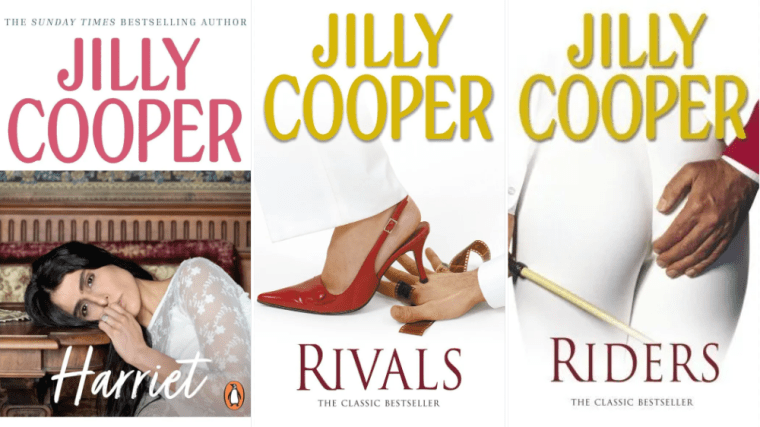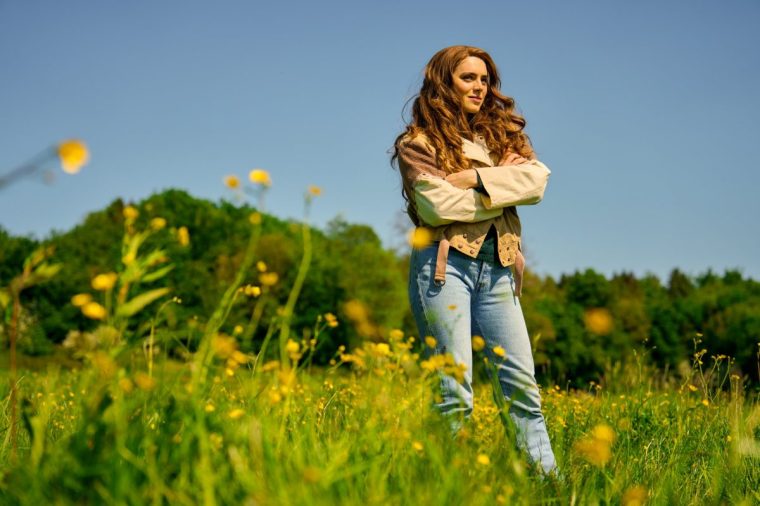All over the country, women are mourning in official Jilly Cooper fashion — pouring an enormous glass of wine, lighting a cigarette and having a huge cry even though it will leave their eyes puffy and ghastly — because the legendary writer has died aged 88.
I’ve read every Jilly Cooper book, some of them upwards of five times, a couple of them a slightly embarrassing double digits. And I can say, as an author, with two degrees in English Literature, that I remain convinced she is the greatest writer of all time.
Everything I know about boozy lunches, sleeping with bad men or, really, just being a woman started with Jilly. The books are deeply outdated in places, and I fear Jilly might not have described herself as a feminist. But within pages none of that matters. Her writing is the most golden kind because it’s gloriously frothy, escapist nonsense on the surface, and perfectly plotted dramatic genius underneath.
While I wouldn’t dream of judging someone who admits they’ve never read Hardy or Tolstoy, I am brimming with disdain for anyone who’s arrived at adulthood without having consumed Cooper’s entire backcatalogue.
Happily, if you have failed to read some of the greatest books of English literature, you’ve got the most enormous treat in store. But where should you start?

Riders
Riders is the first of what’s now known as the Rutshire Chronicles, Cooper’s series set in the fictional Cotswolds area where the men are all prolific shaggers, the women are either ghastly frigid meanies or lovely lushes, and it’s entirely normal to drink three bottles of wine over lunch and then drive home.
Riders contains some of the greatest dramatic tension I’ve ever read. It follows gypsy-born hero Jake Lovell, and Rupert Campbell-Black, a stonkingly privileged knobhead allegedly based on Andrew Parker-Bowles, whom you will find yourself falling in love with, no matter how hard you try not to. Both men are determined to rule the world of show jumping and the competition between them is so beautifully written that even if you’ve never so much as held a pair of reins, you will end up sobbing over the fates of completely fictional horses.
Rivals
This is a sort-of sequel to Riders, in the sense that it gives a delicious update to the lives of characters from Riders. And most importantly for any book, it brings back the sexiest and most offensive romantic hero ever written, Rupert Campbell-Black, this time to fall for the much younger daughter of one of his friends/colleagues, in a love story so perfectly pitched that you can almost forget about the age gap and raft of other problems.
The book is so brilliant that it doesn’t matter that it’s set against the backdrop of TV production consortiums bidding to win a franchise, an extremely niche practice that has been extinct since the nineties. The (very good) adaptation features a cameo from Jilly herself, in case you want to watch it and raise a glass.

Polo
Polo follows the horrible and yet deeply readable Perdita, and her delightfully hapless mother, as Perdita attempts to become a top-class polo player. We also get to spend more time with the rich, badly behaved and wonderful inhabitants of Rutshire, as they shag and make some surprisingly insightful observations about the Falklands War. Polo is a doorstop of a book, several inches thick, and it demands to be read on a sun lounger, by a pool, with slightly wrinkled chlorine pages by the end of your holiday.
It’s also the last of the original Rutshire books that has a sizable chunk of Rupert Campbell-Black material, though many of the others have cameos which should keep withdrawal symptoms at bay.
Tackle!
Tackle! is Jilly’s last book, also set in Rutshire, and if she decided to feature the world of football exclusively so that she could use that title, then you’ll hear no complaints from me.
Here we revisit Cambell-Black, which is not as good as reading one of her early books about him, but still immensely gratifying. We follow him into the world of football, as his son-in-law plays professionally. It’s not a world Cooper knows as well as horses and I’m not sure it’s quite as magic.
But there’s something so generous in her willingness to return to characters we’ve loved for years and watched develop, in some cases from childhood.
By the time you’ve made your way through the previous books, you’ll hardly notice the questionable use of footballer’s accents in dialogue, because the book is set in Rutshire, filled with friendly faces and reading it comes with an overwhelmingly lovely feeling of coming home.

Harriet
One of the main lessons I’ve taken from Jilly Cooper is that if you have a horrible break-up, it’s best to take a new job a long way away from home, ideally working for an extremely handsome and short-tempered man. In Harriet’s case that involves looking after some slightly emotionally damaged children whose glamorous mother has abandoned them.
The book suggests – as do many of the others – that if you’re perpetually a bit useless (leaving the iron on, burning the things you cook) then a very competent man will arrive and save you. If you do have a nasty break-up and decide to attempt the Harriet method of recovery, I can make no hard and fast promises about how well it will work, but it’s worth a try.

Octavia
If you think the complex and unlikable female character was a recent development, then you haven’t met Octavia, who goes on a narrow boat holiday to try and seduce her best friend’s fiancé.
Spoilt, vain and basically ghastly, Octavia is delightful to spend time with and even more delightful to see punished by karma (and, at one point, a man named Gavin, because yes ladies and gentleman, this book has an actual spanking scene in it). One of the most popular of Jilly’s girls’ names romances, Octavia is (very) loosely based on The Taming of the Shrew, only it’s dramatically more enjoyable.
Class
Just when you’ve finished the initial curriculum of the world according to Jilly, and you think it’s all over, you find out that she wasn’t just a novelist but at one point a journalist and a fairly prolific writer of non-fiction. Class is an extremely non-sentimental anthropological examination of the British class system, and the first thing I’d recommend to anyone arriving in the UK and hoping to understand what on earth is wrong with all of us.
If you read one chapter in isolation you might think Jilly a horrible snob, but the lovely thing about Class is that she’s equally rude about absolutely everyone.
Whether you’re from a council estate or a country estate, Jilly’s got a joke at your expense, all of which are very good natured. The only people who ever get a truly hard time from Jilly are the super wealthy show offs with lots of new money, who aren’t a group who are especially in need of our sympathy.
